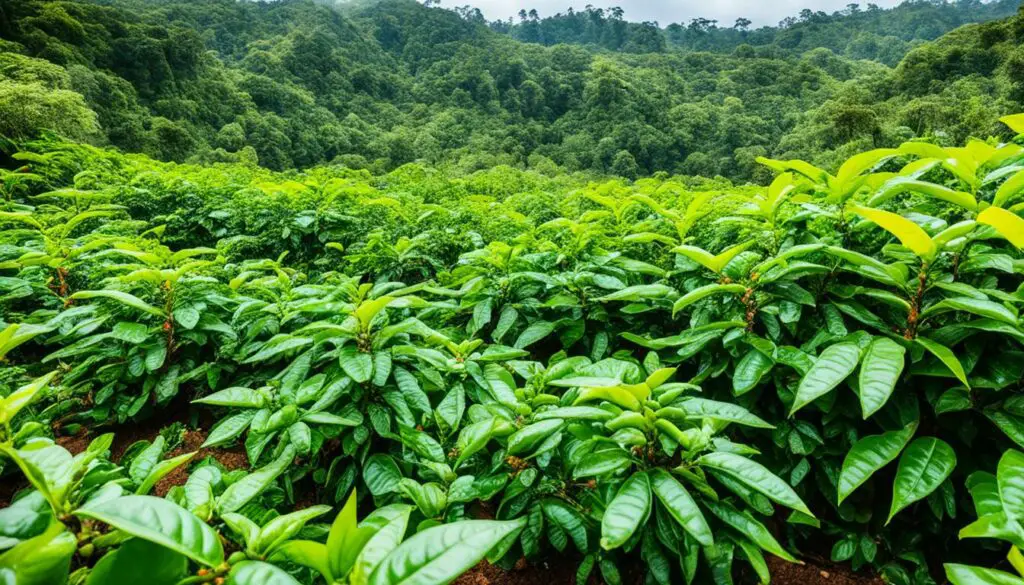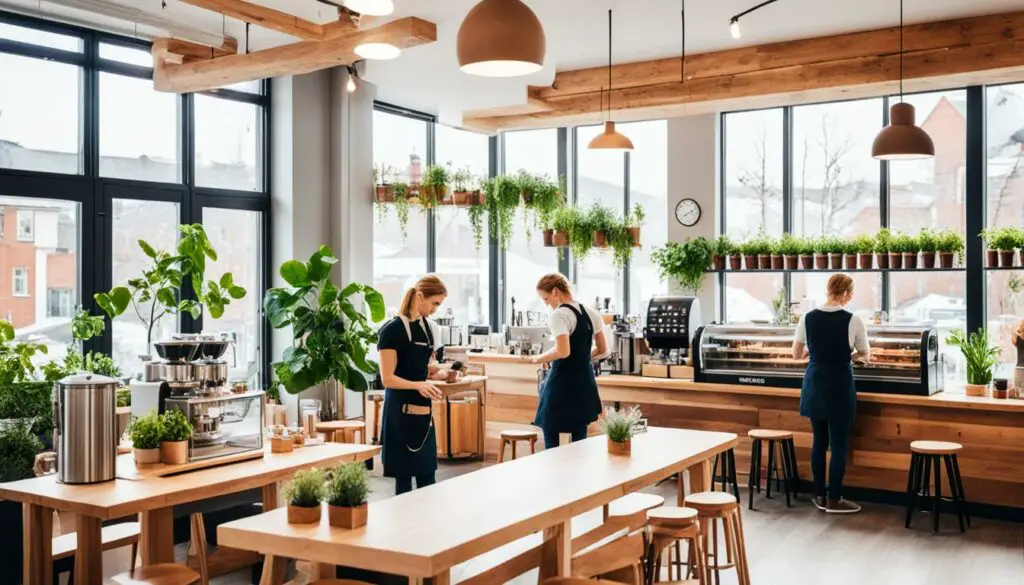Did you know that despite the coffee market’s revenue amounting to $88 billion in 2023, farmers receive only 7 to 10% of the marked retail prices? It’s a shocking statistic that highlights the need for ethical considerations in coffee sourcing. With 62% of Americans drinking coffee daily and consuming an average of 3 cups per day, the impact of our coffee choices goes beyond our morning routine. It’s time to delve into the world of fair trade coffee certification and sustainable coffee farming practices to ensure responsible sourcing and a sustainable future for coffee.
The Complex Coffee Supply Chain
The journey of a coffee bean from seed to cup encompasses a complex supply chain involving various stakeholders, including farmers, exporters, and roasters. This intricate network presents both ethical implications and sustainability challenges for the coffee industry.
Coffee-growing communities, often located in underdeveloped or developing countries, face environmental challenges and rely on manual labor, including child labor, to cultivate and harvest the coffee beans. This raises significant ethical concerns that need to be addressed along the supply chain.
Processing and exporting the coffee beans require making ethical choices to ensure fair compensation for farmers and promote environmentally conscious sourcing practices. Fair wages and proper working conditions are crucial to supporting the livelihoods of these farmers and their communities.
The roasting and packaging of coffee beans also play a pivotal role in determining the flavor and quality of the final product. Roasters must prioritize responsible sourcing and ethical practices to maintain the integrity of the coffee supply chain.
At the retail level, consumers can make informed choices that support ethical practices and sustainability. By opting for coffee brands with transparent and eco-friendly sourcing, consumers contribute to the overall improvement of the coffee supply chain.
It is essential for the coffee industry to address these ethical implications and sustainability challenges in the supply chain to ensure a responsible and sustainable future.
Key Points:
- The coffee supply chain involves farmers, exporters, roasters, and retailers.
- Coffee-growing communities often face environmental challenges and rely on manual labor.
- Processing and exporting require ethical choices for fair compensation and environmentally conscious practices.
- Roasting and packaging play a crucial role in determining coffee quality.
- Consumers can support ethical practices and sustainability through informed choices.
Fair Trade and Direct Trade Models
Fair trade and direct trade models have revolutionized the coffee industry, offering ethical alternatives to conventional sourcing practices. These models aim to ensure equitable compensation for coffee farmers, promote sustainable livelihoods, and support the preservation of a balanced ecosystem.
Fair Trade Coffee:
The fair trade certification guarantees fair prices for coffee farmers and provides a range of additional benefits. By adhering to fair trade standards, companies commit to paying a premium price for coffee beans, which helps improve the farmers’ income and living standards. This certification also promotes the cultivation of coffee using sustainable farming practices, minimizing the negative environmental impact.
Direct Trade Coffee:
Direct trade, on the other hand, establishes a direct relationship between coffee producers and buyers. This model emphasizes transparency and allows consumers to trace the journey of their coffee from farm to cup. With direct trade, coffee farmers receive higher prices for their beans, bypassing traditional intermediaries, and ensuring greater financial stability and control over their product.
Shared Values:
Both fair trade and direct trade models share common values centered around responsible sourcing, community development, and the promotion of sustainable cultivation practices. Ethical considerations such as fair compensation, social empowerment, and environmental stewardship are essential components of these models.
Consumer Impact:
As consumers, our choices have a significant impact on the coffee industry and the lives of coffee-growing communities. By supporting fair trade and direct trade coffee, we contribute to the well-being of farmers, ensuring they receive equitable compensation for their hard work. Additionally, these models foster sustainable livelihoods and encourage the preservation of a balanced ecosystem, which is essential for the long-term sustainability of the coffee industry.
Environmental Impact and Shade-Grown Coffee
The cultivation of coffee has a profound environmental impact, resulting in deforestation, the use of chemicals, and the adoption of monoculture practices. The repercussions of these practices are far-reaching and contribute to the degradation of ecosystems. Additionally, climate change poses a significant threat to coffee production, with estimates suggesting that nearly half of the arable coffee-growing land could be unsuitable by 2050. It is crucial to address the environmental challenges faced by the coffee industry and explore sustainable alternatives.
One such alternative is the cultivation of shade-grown coffee, which has gained traction as an environmentally friendly approach. Shade-grown coffee involves growing coffee plants under a canopy of diverse trees, mimicking the natural habitat of coffee in the forest. By emulating natural conditions, shade-grown coffee promotes biodiversity and contributes to soil enrichment.
The Benefits of Shade-Grown Coffee
- Biodiversity: The diverse canopy of shade trees provides a habitat for various plant and animal species, promoting biodiversity and ecological balance.
- Soil Enrichment: The shade trees create a microclimate that supports complex soil ecosystems, enhancing soil fertility and nutrient cycling.
- Wildlife Habitat: The shade canopy creates a sanctuary for birds, insects, and other wildlife, fostering a thriving ecosystem.
- Prevention of Soil Erosion: The shade trees act as a natural buffer, reducing water runoff and preventing soil erosion.
Shade-grown coffee not only mitigates the environmental impact of coffee cultivation but also provides economic benefits for farmers. By embracing this sustainable approach, farmers can diversify their income through the sale of shade trees’ products, such as fruits and timber.
By supporting shade-grown coffee, consumers contribute to the preservation of biodiversity, the enhancement of soil quality, and the overall sustainability of the coffee industry. This environmentally friendly choice empowers coffee farmers to adopt responsible practices that promote a healthier planet and a more sustainable future.
Organic and Certified Coffee
When it comes to coffee, sustainability and ethical quality standards are of utmost importance. That’s why the cultivation of organic coffee has gained significant popularity in recent years. Organic coffee farming practices prioritize the use of chemical-free methods, ensuring that the coffee beans are free from pesticides, herbicides, and synthetic fertilizers. This not only protects the health of farmers and consumers but also helps maintain the long-term fertility of the soil.
But there’s more to ethical coffee sourcing than just going organic. Certified coffee takes sustainability a step further by obtaining rigorous certifications that guarantee ethical quality standards. Two prominent certifications in the coffee industry are USDA Organic and Rainforest Alliance. These certifications ensure that coffee beans are grown in a manner that considers fair wages, safe working conditions, ecosystem preservation, and biodiversity conservation.
By choosing organic and certified coffee, consumers can actively support sustainable cultivation practices and promote responsible sourcing in the coffee industry. Not only does it contribute to the well-being of coffee-growing communities, but it also helps protect the environment and conserve natural resources.
The Benefits of Organic and Certified Coffee:
- Protects farmers and consumers from harmful chemicals
- Preserves the fertility of the soil
- Ensures fair wages and safe working conditions for coffee farmers
- Supports biodiversity conservation and ecosystem preservation
- Contributes to a more sustainable and responsible coffee industry
| Certification | Description |
|---|---|
| USDA Organic | Guarantees that coffee beans are grown using organic farming practices, free from synthetic chemicals and genetically modified organisms (GMOs). |
| Rainforest Alliance | Focuses on sustainable farming methods that protect ecosystems, promote the well-being of farmers, and improve their livelihoods. |
Choosing organic and certified coffee is not only a delightful way to enjoy your cup of joe but also a conscious choice to support sustainable cultivation practices and uphold ethical quality standards in the coffee industry.

Supporting Coffee-Growing Communities
Supporting coffee-growing communities goes beyond the taste of a good cup of coffee. It involves enhancing ethical livelihoods, providing fair wages, and improving access to education and healthcare for farmers. By recognizing the importance of coffee farmers’ well-being, suppliers and retailers contribute to the reputation-building of coffee beans, ensuring that ethical livelihood enhancement is at the forefront of the industry.
Multinational brands have taken proactive steps to empower farming communities through various initiatives, such as loan programs, resource centers, and market access projects. These efforts aim to allocate resources effectively and empower local farmers to thrive in the coffee industry. By supporting initiatives that prioritize empowerment, consumers play a vital role in improving the living conditions of coffee-growing communities and the overall well-being of farmers.
One such multinational brand that has made significant strides in supporting coffee-growing communities is Starbucks. Through their ethical sourcing practices and investments in farmer support centers, Starbucks has been able to enhance the livelihoods of thousands of coffee farmers worldwide and promote resource allocation for sustainable farming practices. Their commitment to responsible sourcing has paved the way for other companies to prioritize ethical livelihood enhancement and contribute to the betterment of coffee-growing communities.
Impact of Ethical Livelihood Enhancement:
The impact of ethical livelihood enhancement goes beyond financial stability for coffee farmers. It enables them to invest in better education for their children, access healthcare services, and improve the overall standard of living within their communities. By ensuring fair compensation and empowering coffee farmers, the entire supply chain benefits from improved quality and sustainability.
Resource Allocation and Sustainable Development:
Resource allocation plays a crucial role in sustainable development within coffee-growing communities. It involves providing farmers with the necessary tools, knowledge, and financial support to adopt sustainable farming practices. These practices not only preserve the environment but also contribute to the long-term viability of the coffee industry.
| Benefits of Supporting Coffee-Growing Communities | Examples of Empowering Initiatives |
|---|---|
|
|
Conclusion
Ethical considerations in coffee sourcing are crucial for building a sustainable future for the coffee industry. By understanding the complexities of the coffee supply chain, embracing fair trade and direct trade models, and prioritizing environmental sustainability, the industry can ensure responsible practices and equitable compensation for farmers.
Consumer choices play a significant role in promoting ethical sourcing and supporting coffee-growing communities. With a focus on transparency, traceability, and education, the coffee industry can work towards a more sustainable and socially responsible future.
To create a sustainable future for coffee, it is essential for consumers to be empowered through knowledge and awareness. By choosing coffee that is sourced ethically and sustainably, consumers can make a positive impact and support the well-being of coffee-growing communities worldwide. Responsible sourcing practices, such as fair trade and direct trade, allow for direct relationships between producers and buyers, ensuring that farmers receive fair compensation for their hard work.
Furthermore, prioritizing environmental sustainability in coffee cultivation is vital. Shade-grown coffee, organic farming practices, and certifications such as USDA Organic and Rainforest Alliance contribute to biodiversity preservation and soil enrichment. By making conscious choices, consumers have the power to support a sustainable future for coffee and contribute to a more equitable and responsible coffee industry.












